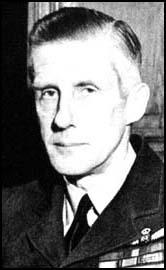Edgar Ludlow-Hewitt

Edgar Ludlow-Hewitt, the son of a clergyman, was born in County Cork on 9th June 1886. Educated at Radley School and Sandhurst Military Academy he was commissioned into the Royal Irish Rifles in 1905 but transferred into the Royal Flying Corps in August 1914.
On the outbreak of the First World War Ludlow-Hewitt was sent to France where he saw action over the Western Front and was eventually promoted to wing commander. Mentioned in dispatches six times and won the Military Cross in 1916 and the Legion of Honour in 1918. By the end of the war Ludlow-Hewitt was Chief Staff Officer at the RAF Headquarters in France.
Ludlow-Hewitt remained in the Royal Air Force after the war and served as Commandant of the RAF Staff College (1926-30), Director of Operations and Intelligence at the Air Ministry (1933-35) and Chief Air Officer in India (1935-37) before being appointed Commander in Chief of Bomber Command in 1937.
During the Second World War senior figures in the Air Ministry became increasingly critical of Ludlow-Hewitt's performance as head of Bomber Command and in February 1940 he was replaced by Charles Portal. For the rest of the war Ludlow-Hewitt served as Inspector-General of the RAF.
After retiring from the RAF in 1945 Ludlow-Hewitt was appointed Chairman of the Board of Governors of the College of Aeronautics and served as Deputy Lieutenant for Wiltshire. Edgar Ludlow-Hewitt died on 15th August 1973.
Primary Sources
(1) In his report Readiness For War, Edgar Ludlow-Hewitt explained the problems that RAF pilots would have to overcome during bombing raids on the enemy (March, 1939)
The mission may often be flying above cloud until close to its target, when they will come down and must pick up the target with as little delay as possible. The complicated and congested appearance of an industrial area is notoriously most confusing to crews of aircraft, and it is impossible to provide them with too much assistance in picking out their particular objective from the tangled mass of detail.
(2) Just before the outbreak of the Second World War, Edgar Ludlow-Hewitt, wrote a report for the Air Ministry (May, 1939)
There is little doubt that the weakest point of our bomber force at this moment lies in its gun defence. I fear that the standard of efficiency of air gunners and their ability to resist hostile attack remains extremely low.
We have all this valuable equipment and highly trained personnel depending for its safety upon one inadequately trained and inexperienced individual, generally equipped with a single relatively inadequate gun in a very exposed position in the tail of the aircraft. Here he has to face the full blast of the eight-gun battery of the modern fighter. The demands which will be made on the coolness, presence of mind, skill and efficiency of this single individual are, in existing conditions, almost superhuman, and in his present state of knowledge and training it is utterly fantastic to expect the efficient defence of the aircraft.
As things are at present, the gunners have no real confidence in their ability to use this equipment efficiently in war, and captains and crews have, I fear, little confidence in the ability of the gunners to defend them against destruction by enemy aircraft.
(3) Arthur Harris wrote about Edgar Ludlow-Hewitt in his book Bomber Command (1947)
Never have I come across an officer in any of the services who so completely commanded and earned the faith and respect of his subordinates. In losing Ludlow-Hewitt we lost the finest of commanders. But our loss in the end was the gain of the Service as a whole, because as an Inspector-General, with his immense technical ability and practical knowledge, Ludlow-Hewitt had an influence during the rest of the war on design, production, development and organization which was of incalculable value through the service. Without him I am sure we should never have prevailed.
